
Coromandel, also called Coromandel Town to distinguish it from the wider district, is a town on the Coromandel Harbour, on the western side of the Coromandel Peninsula, which is in the North Island of New Zealand. It is 75 kilometres east of the city of Auckland, although the road between them, which winds around the Firth of Thames and Hauraki Gulf coasts, is 190 km long. The population was 1,890 as of June 2021.

The Kapiti Coast District is a local government district of the Wellington Region in the lower North Island of New Zealand, 50 km north of Wellington City. The district is named after Kapiti Island, a prominent island 5 km offshore.

Waiheke Island is the most populated and the second-largest island in the Hauraki Gulf of New Zealand. Its ferry terminal in Matiatia Bay at the western end is 21.5 km (13.4 mi) from the central-city terminal in Auckland.

Horowhenua District is a local government district on the west coast of the North Island of New Zealand. It forms part of the Manawatū-Whanganui region. Its name roughly means shaking or rippling earth.
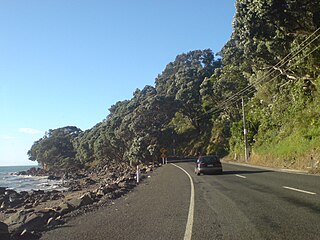
The Thames-Coromandel District is a territorial authority district in the North Island of New Zealand, covering all the Coromandel Peninsula and extending south to Hikutaia.
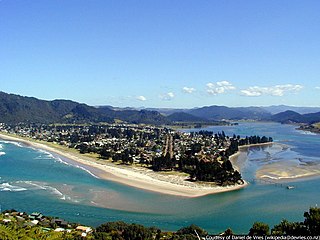
The town of Pauanui is on the east coast of the Coromandel Peninsula in the North Island of New Zealand. It lies at the mouth of the Tairua River on its south bank, directly opposite the larger town of Tairua.
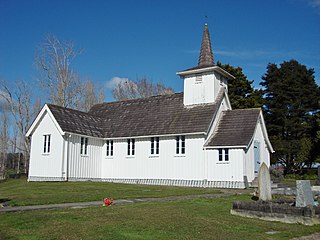
Clevedon, previously known as Wairoa South, is a rural town in Auckland, New Zealand, located in the Franklin ward, one of the thirteen administrative divisions of Auckland city. The town is governed by the Auckland Council. The town is the centre of an administrative ward of Franklin which takes in much of the largely rural area to the east of the urban heart of the city.

Grey District in the West Coast Region of New Zealand is a municipality that covers Greymouth, Runanga, Blackball, Cobden and settlements along the Grey River. It has a land area of 3,516.48 square kilometres (1,357.72 sq mi). The seat of the Grey District Council, the local government authority that administers the district, is at Greymouth, where 58.9% of the district's population live.

Oneroa is a settlement on Waiheke Island in northern New Zealand. It was known as the capital city of the island.

Ostend is a settlement on Waiheke Island, in New Zealand's Hauraki Gulf within the Auckland Region. Ostend is located in the west of the island, on and around a small peninsula which juts into Putiki Bay, one of two large indentations in the island's southwest coast. The southwest of the island contains much of the island's population, with Ostend being located immediately to the east of the settlement of Surfdale, and to the southwest of Onetangi.

Maraetai is a town in the former Manukau City and the easternmost suburb of greater Auckland in New Zealand.

Tokomaru is a small town in the district of Horowhenua, in the southwestern North Island of New Zealand. It is located 18 kilometres southwest of Palmerston North, and a similar distance northeast of Shannon. The Tokomaru railway station on the North Island Main Trunk was open from 1885 to 1982.

Ashley is a small town in North Canterbury, in the South Island of New Zealand. It used to have a railway station on the Main North Line that runs through the village.
Pongakawa is a rural community in the Bay of Plenty of New Zealand's North Island. State Highway 2 runs through it.

Putiki is a settlement in the Whanganui District and Manawatū-Whanganui region of New Zealand's North Island, located across the Whanganui River from the Wanganui township. It includes the intersection of State Highway 3 and State Highway 4.

Whanganui Central is the central business district and central suburb of Whanganui, in the Whanganui District and Manawatū-Whanganui region of New Zealand's North Island.
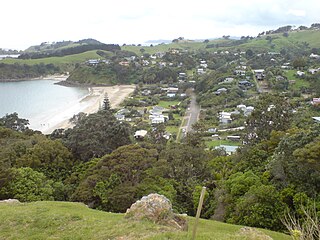
Palm Beach is a settlement on Waiheke Island in northern New Zealand. The eponymous beach is named for phoenix palms at the eastern end, and has safe swimming and white sand.

Surfdale is a settlement on Waiheke Island in northern New Zealand. The original name being Okahu, Surfdale beach on Huruhi Bay has tidal mudflats, and is often used for windsurfing or kitesurfing. Shelly beach on Pukiki Bay is sandy and shelly. The area was developed in the mid–1920s.
Rural Waiheke comprises the eastern and southern parts of Waiheke Island in the Hauraki Gulf near Auckland, in New Zealand. Apart from small settlements at Rocky Bay and Orapiu, the area south and east of Onetangi is mostly private farmland. Waiheke Island Aerodrome is approximately in the centre of the island.
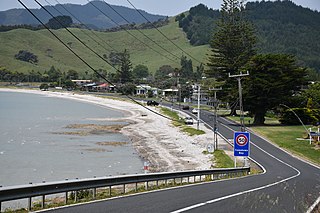
Kawakawa Bay is an east coast bay and settlement in the Franklin area of New Zealand's Auckland Region.



















